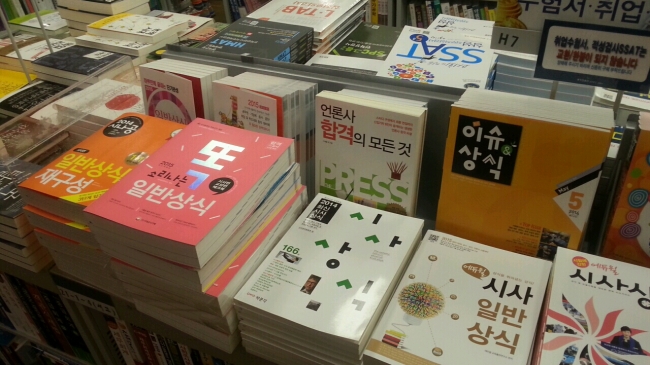Ahn Jae-hyun works at a company many Koreans term as a “workplace of the gods” ― one that offers high job security and a host of other perks ― but what he does is not his dream job.
“I still dream of becoming a journalist,” says the 29-year-old office worker. Ahn, who once interned at a local newspaper, says that he prefers a journalist’s “thrilling life” over a “comfortable life.”
“I cannot forget the thrill of seeing my efforts presented in the form of an article in the newspaper each day.”
 |
Study books for journalism recruitment tests are displayed at a bookstore. (Ock Hyun-ju/The Korea Herald) |
Every day after work, Ahn spends hours monitoring the news, writing essays or taking private lessons in preparation of news organizations’ notoriously difficult entrance exams. Once a week, he meets with study groups where aspiring news hounds exchange opinions on the latest social issues and review each other’s writing assignments.
In Korea, those who seek a career in journalism need to pass a series of exams at media companies, and many take years to pass the tests. The already difficult task of mastering the variety of skills needed to pass the tests is made harder by the intense competition.
Last year, more than 2,000 people competed for a mere 81 places at 11 media companies, according to the Journalists Association of Korea.
Lee Seong-eun, 27, is just one of many whose ambitions have been blocked time and again. Over the last two years, he applied to 30 news organizations.
As the preparation period drags on, he is faced with mounting financial and social pressure.
“My friends who already got a job buy me meals when we go out, but that makes me feel uncomfortable,” Lee said. To feed himself, Lee works part-time delivering parcels for a logistics company every evening.
The uncertain future also puts would-be journalists in a difficult position.
“It is tiring that I have to keep going forward without knowing when the next exam will be and how many jobs will be available this year,” Kim Dong-kyu, 31, said. However, he remains determined.
“Being a journalist would give me a chance to explore different aspects of our society and correct irregularities. That way I could bring about positive change in our society with my articles,” Kim said.
A cub reporter working for one of the biggest newspapers in Korea acknowledges that the yearslong preparation was worth it. He quit a well-paid job to become a reporter, but has no regrets.
“Since I became a journalist, my days have been hectic and I have spent many sleepless nights working. But I feel alive when I interact with dozens of people every day to learn about their experiences.”
By Ock Hyun-ju (
laeticia.ock@heraldcorp.com)








